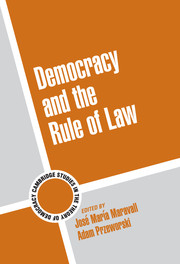Book contents
- Frontmatter
- Contents
- List of Contributors
- Acknowledgments
- Introduction
- Part I
- 1 Lineages of the Rule of Law
- 2 Power, Rules, and Compliance
- 3 Obedience and Obligation in the Rechtsstaat
- 4 A Postscript to “Political Foundations of Democracy and the Rule of Law”
- 5 Why Do Political Parties Obey Results of Elections?
- Part II
- Part III
- Author Index
- Subject Index
1 - Lineages of the Rule of Law
Published online by Cambridge University Press: 09 November 2009
- Frontmatter
- Contents
- List of Contributors
- Acknowledgments
- Introduction
- Part I
- 1 Lineages of the Rule of Law
- 2 Power, Rules, and Compliance
- 3 Obedience and Obligation in the Rechtsstaat
- 4 A Postscript to “Political Foundations of Democracy and the Rule of Law”
- 5 Why Do Political Parties Obey Results of Elections?
- Part II
- Part III
- Author Index
- Subject Index
Summary
This chapter elaborates a highly stylized and simplified account of the emergence of two features of the rule of law as commonly understood: predictability and equality. Legal historians would stress the role of economic, demographic, technological, scientific, religious, and cultural factors in bringing about and stabilizing institutional innovations as startlingly novel as legal certainty and equality before the law. When describing the role of important social actors in promoting or inhibiting such developments, they would weave into their story a variety of factors, including ideology, irrational passions, improvisation within inherited institutions, and the unexpected consequences of habitual behavior in a changed setting. My objective, in what follows, is both more modest and more theoretical.
I aim to clarify the reasons why powerful political actors might furiously resist or warmly embrace the rule of law. We cannot explain why the rule of law does or does not emerge in a specific historical context by invoking nothing but the strategic calculations of powerful political actors. But the self-interested reasons why powerful members of a society might encourage or discourage such a development are undoubtedly relevant and deserve a focused treatment.
I ask, first, why governments, with the means of repression in their hands, might be induced to make their own behavior predictable. For help in answering this question, I turn to Machiavelli. His thesis, essentially, is that governments are driven to make their own behavior predictable for the sake of cooperation.
- Type
- Chapter
- Information
- Democracy and the Rule of Law , pp. 19 - 61Publisher: Cambridge University PressPrint publication year: 2003
- 34
- Cited by



